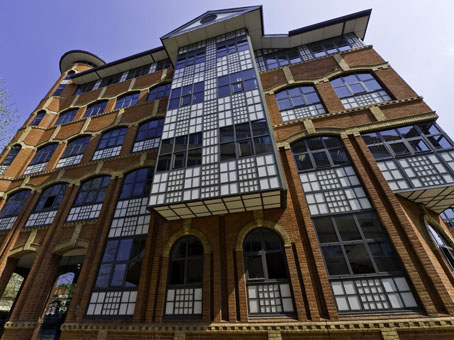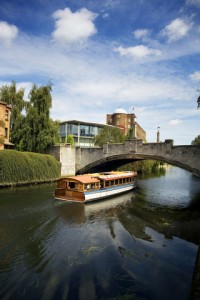
[Last updated April 2023] For further offices information or to search for offices for rent in Norwich just click. Or contact us for any other query.
A guide to serviced offices and office space to rent in Norwich as well as general information that may be useful if you are thinking of renting office space in Norwich.
History & Geography
Norwich is located in the far east of England in the country of Norfolk in the area known as East Anglia. The city is bisected by the River Wensum which then meets the River Yare flowing up from the south of the city. Norwich started life as a small Anglo-Saxon settlement in the fifth century which gradually grew to become the foremost trading centre in the area. By the 11th century, Norwich had expanded significantly and was a busy hub of commerce, mainly due to its advantageous position on the River Yare which is navigable to the North Sea. However, in 1004, it was raided by the Viking commander Sven Forkbeard and burnt to the ground. Nevertheless, the city was rebuilt and continued to prosper. By the time of the Norman Conquest in 1066, Norwich was one of the largest and richest cities in the country. The Normans added to the city’s strategic importance by constructing a castle in the city, the only one of its kind in East Anglia. The city continued to prosper during the Middle Ages, especially from the wool trade. This trade funded the construction of dozens of churches and currently, Norwich has more medieval churches than any other city in Western Europe. During the 16th century, the population of the city was bolstered by the arrival of many Dutch and Flemish immigrants fleeing Catholic persecution. Eventually, these refugees made up one-third of the population of Norwich. The city integrated the immigrants and their trading connections with Europe added to the city’s prosperity. The Flemish refugees also brought with them to the city their pet canaries which they bred locally and which eventually became, and remain, the city’s mascot. The city continued to prosper throughout the 17th and 18th centuries off the back of its wool and textile trade and developed a thriving cultural scene. Norwich declined somewhat during the industrial revolution of the 19th century, losing out to England’s northern industrial hubs. However, it retained its reputation for textile manufacturing as well as its shoe-making industry. In the 20th century, the city also acquired a reputation for chocolate manufacturing as well aircraft design. Norwich sustained severe bomb damage during WWII but was extensively rebuilt in the following years. Today it is one of the most important cities in eastern England and a hub of education, trade and service-based industries.
Economy
Like many cities in England, Norwich’s economy has undergone a significant change in character, from manufacturing to mainly service-based industries. The insurance and financial services company Aviva, formerly known as Norwich Union, is the best example of the kind of company which is dominant in the Norwich economy. One production company that still survives in the area is Colman’s, the maker of mustard and other condiments, which still operates out of its factory at Carrow. Publishing is also a major industry in the city, with the company, Archant, being the largest in the field. Archant publishes four daily newspapers and 75 weekly ones as well as a host of magazines. Norwich also has a thriving retail industry and is among the top ten most prosperous shopping destinations in the UK. Norwich is also a popular destination for students with the University of East Anglia, based on the city’s outskirts, one of the foremost universities in the country.

Culture & Tourism
While Norwich is not one of the UK’s foremost tourist destinations, it has become a popular place to take a city break. Among its attractions is Norwich Cathedral which dates from the 12th century and is one of the finest examples of Norman architecture in the country. Norwich is also known for the cobbled streets and museums of its old quarter as well as Norwich Castle which has been transformed into a museum and art gallery. Norwich is also well known for the Norfolk and Norwich Festival, an arts festival held every May which is among the largest and most well-respected in the UK. Additionally, Norwich has a thriving theatre culture with many venues including the Theatre Royal, Norwich Playhouse, Maddermarket Theatre and Norwich Puppet Theatre. The city is also well known for its thriving nightlife, mainly located around Tombland, Prince of Wales Road and the Riverside area close to Norwich station. The abundance of students in the city makes the nightlife and music scene more vibrant than most.
Transportation
Norwich railway station, located in the east of the city, has services to London Liverpool Street every half-hour as well as Liverpool, Nottingham, Manchester and Cambridge. The city itself is served by an extensive bus system popular among residents. The city’s airport, Norwich International Airport, is a feeder to KLM’s Schipol and is served by Eastern Airways and Bristow Helicopters.

Office space to rent in Norwich
In 2013, following the Great Recession, the Norwich office market had a supply of almost eight million square feet with a vacancy rate of approximately ten per cent.
However, forecasts at the time, predicted the vacancy rate would drop in the coming year. Rents were stable at an approximate average of £16.50 per square foot per year. The main out-of-town office location was the Broadland Business Park, an ever-expanding high-tech office and industrial park. Like virtually all sizable cities in the UK, Norwich suffered considerably in the aftermath of the financial crisis, however, there were signs, in 2013, that the local economy was starting a slow recovery along with the rest of the country.
Norwich’s office space market saw the highest rate of take-up in 5 years, in 2021, at just under 250,000 square feet. The number of Grade A requirements remained strong in 2022 from occupiers in the technology R&D industry as well as life, food and agriculture science sectors.
It was expected that those requirements would absorb the majority of Grade A office space within the year putting upward pressure on rental levels.
High-quality office space is being quoted at £17.50 per square foot in 2023 and it is expected strong demand will push rents closer to £20 per square foot in the coming years.
Our office space search, advisory and acquisition services are FREE, always. We are globally regulated by the Royal Institution of Chartered Surveyors (RICS) ensuring the highest standards of commercial property search advice and service at all times.

The Office Providers is Regulated by the RICS